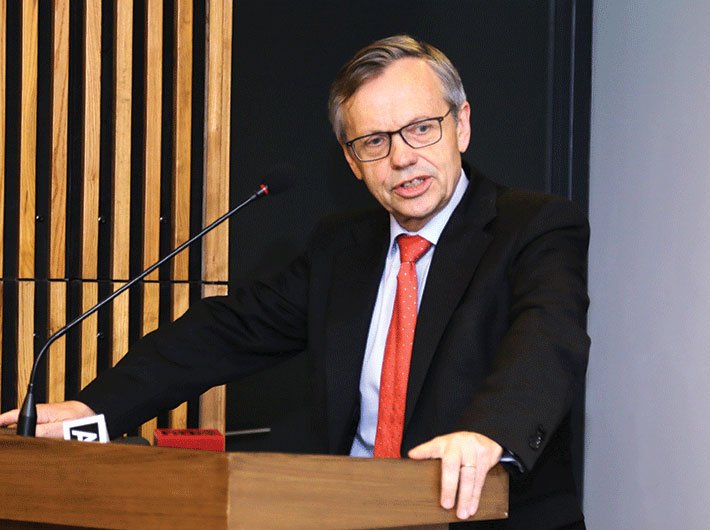The Norwegian embassy in Delhi, the Royal Norwegian Consulate General in Mumbai, and the Norwegian Business Association India, released a business climate survey report in Delhi in December. The report evaluates the current and future business climate for Norwegian companies in India. Nils Ragnar Kamsvåg, ambassador of Norway to India, speaks to Praggya Guptaa about the promising business opportunities in India, demonetisation and other matters.
There was a currency crisis in Norway last year. Can you tell us something about it?
It was not a currency crisis, but a crisis related to the oil and gas price spin. The oil and gas sector constituted more than 20 percent of our GDP and more than 50 percent of our exports. Two years ago, when the oil prices fell very strongly, it had a strong impact on our economy. Due to this, Norway’s currency (the krone) weakened to 15-20 percent. However, that was not felt as a currency crisis in Norway but rather it was seen both by the government and trade unions (as a spur) to a smooth transition from a heavy reliance on oil and gas to more traditional things. From the macro-economic view, we are doing fairly well. We have growth in the economy, although it has been weak. But it can be seen against the backdrop of Norway, which has seen very strong growth in the last 15-20 years, much stronger than any other European country. Today we have one of the highest per capita GDPs in the world.
Norway also has the biggest Sovereign Wealth Fund in the world, which is filled from our income from oil and gas. About 15-20 years back, convention said oil and gas is something which we should not be consuming as it also belongs to future generations. So it was decided to build a wealth fund, from which only four percent can be taken out. We had an opportunity to spend from it in the economy without incurring debt. Moreover, the fund had been growing with very high oil prices and we are nowhere near spending that four percent.
What is your opinion on the demonetisation step undertaken by the Indian government? Did you feel any impact of it?
It is a lot about goals that the government has for it. If they reach their goals with this measure, it will certainly be beneficial for India. Yes, we have also felt its impact, but not more than any Indian living here.
Do you think with initiatives like demonetisation, India can match the level of Norway in becoming cashless?
Norway is, to a very high degree, cashless. Once, I went for a month’s vacation to Norway with some cash. When I came back I had hardly spent any of it. This act (demonetisation), along with certain other initiatives, will certainly contribute if it works out right. I don’t think it (becoming cashless) is a short-term goal of the government but rather a gradual development. Certainly, the more cashless you can make the economy, the easier it is for the government to reduce the black economy. It becomes easier to make people who should pay taxes, pay taxes.
What are the business opportunities you are seeking in India?
We appreciate the efforts being made by the Indian government to make the investment environment more open and easy to work in. There is clear willingness in both Norway and India to do more. We have done this business climate survey that shows that Norway is a big investor in India. It shows that the companies invested in India are very optimistic about their future. According to the survey, 62 percent of them are satisfied with the business climate here, 75 percent of them think it will be better in the next two to three years, and more than 80 percent will recommend a set-up in India. Only three percent were against it. Things are looking up and, as more and more Norwegian companies start looking at India as a potential investment market, the confidence on both sides will grow.
Climate change is a big challenge. How can the problem be addressed?
We recently had a seminar in India where we talked about snow melting in the Himalayas, and the Arctic and Antarctic circles. Snow melting in the Himalayas is actually connected with the melting of snow in the Arctic. Norway has always been a driver of strong measures for preventing climate change and it is very encouraging to see a much stronger Indian engagement in this field. I think India plays a very important global role in this as without India succeeding in developing the economy in a more climate-friendly way, we will not succeed globally. It is very encouraging to see that the Indian government is very strongly supporting this subject.
What is your comment on global leaders like Donald Trump who deny climate change?
They should stick to the advice they get from scientists.
How are you promoting tourism in Norway?
Last year, we saw a more than 20 percent increase in tourism. This year, we wish for higher growth in the number of Indians travelling to Norway. Norway is a very exotic location, and more and more Indians are getting interested in visiting the country. The focus this year is to get more Indian movies to shoot at locales in Norway. Last year, two were shot there. We hope to have four this year.
pragya@governancenow.com
(The interview appears in the December 16-31, 2016 issue)

